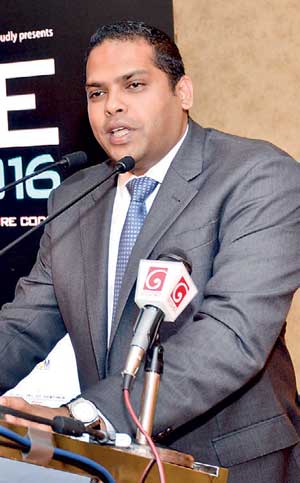01 Dec 2016 - {{hitsCtrl.values.hits}}
By Zahara Zuhair
While unfolding the digitisation process which Sri Lanka will experience for next year, Telecommunication and Digital Infrastructure Minister Harin Fernando said that the main challenge they face is unifying the vision for the country in their endeavour to digitise the whole nation, as there is so much diversified in different corners.
“Digitisation is not understood by many Sri Lankans. A lot of people criticize that we are giving tabs to the schools, and they say kids still don’t understand. I’m pretty sure the kids understand what we are going to do more than the elders,” he said during a presentation at the launch of CodeCraft competition held in Colombo recently.
As the government intends to create one million jobs, he said that the Prime Minister is looking at creating at least 300,000 jobs from his ministry next 3-5 years. With Rs.25 billion allocated in the budget for next year, he said there is immense potential for the industry.
He said that Sri Lanka now has good space, as they have covered 2/3 of the country with fibre optic.
He said with the two submarine cables launched by Dialog and Sri Lanka Telecom, it gives six times better broadband speed. “Sri Lanka has best speeds than India, Pakistan, Bangladesh right now in the region. So we just need to put the infrastructure and the right companies in,” he said.
He also confessed that the government has a huge problem in communicating on what they do. “Right now we have more than 405 free WiFi sites. We couldn’t put up a board and give the publicity, we are trying to fix it. By next year there will be 1000 free WiFi sites up in Sri Lanka,” he said.
Another issue highlighted was the current education system, as ICT is being used as a single subject but not as a tool to enhance, as well as the lack of qualified ICT teachers. It was also stressed the need of having a long term vision for ICT. Under the one million tab strategy, he said that they have already started with A/L students, and will be moving on to providing tablets to gramasewakas, midwives and policemen. “The midwives is a brilliant concept I saw in Rwanda, where you can show them the visual impact and procedures,” he said.
He said that some of the less developed countries who are not doing well are also have implemented this tab strategy and are now very successful.
Another concept imparted was the providing of digital identity, and the minister said that already tenders are closed for this and technical evaluation is done.
“This is one of the most highly sophisticated cards, because we will be following Estonian and Swedish models. We will be the third country to implement it. So the world’s best company wanted us to be the sample model, just to take it to other countries. Sri Lanka will become the talking point,” he said.
In terms of digital health, it was noted that MRI type of outputs cost the government almost Rs. 1000-1500 per document taken out of these machines, whereas with the electronic system it would be avoided.
Further, it was mentioned that every citizen will be provided with a digital wallet as everyone will be a part of the financial inclusion as well as the digital signature enabling the citizens to electronically-sign documents.
In addition to that, it was also noted that the Data Privacy Act would be implemented soon.
09 Jan 2025 41 minute ago
09 Jan 2025 1 hours ago
09 Jan 2025 1 hours ago
09 Jan 2025 2 hours ago
09 Jan 2025 2 hours ago